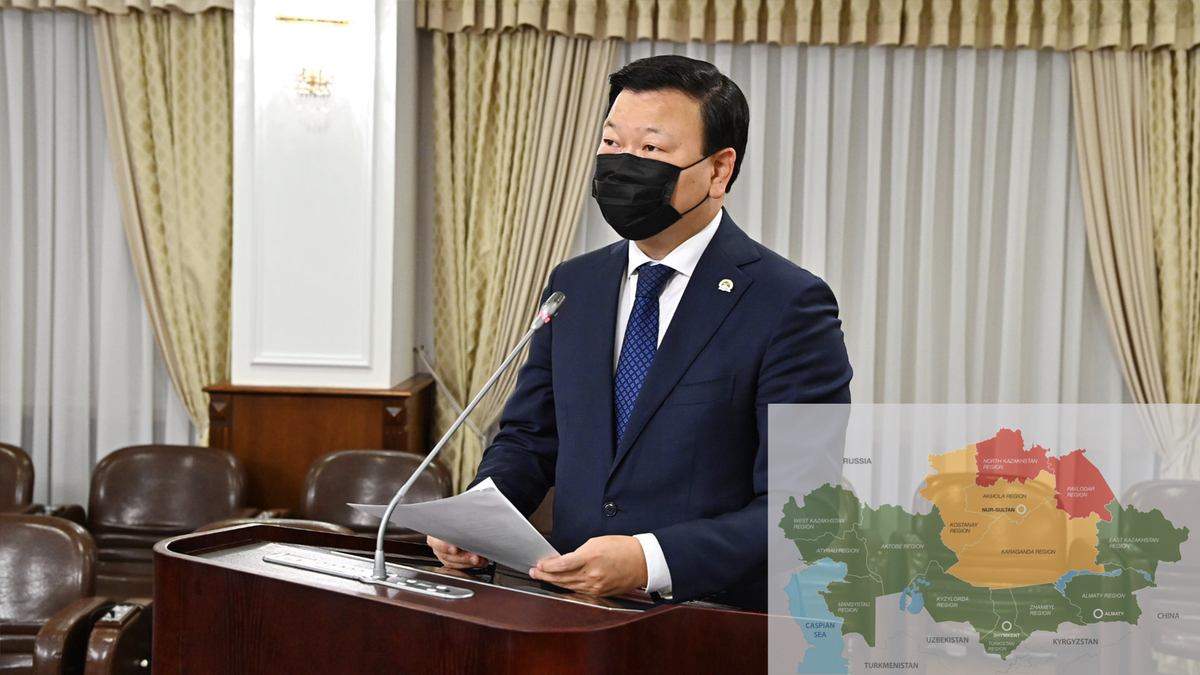NUR-SULTAN – The COVID-19 situation remains stable in Kazakhstan, said Healthcare Minister Alexei Tsoy at a government meeting on Tuesday.
As of Nov. 23, Kazakhstan confirmed 965,518 cases of COVID-19 in the country and an additional 81,977 cases of pneumonia that show symptoms of COVID-19 but are not clinically confirmed.
Kazakhstan is now in a low-risk green zone as are the country’s ten regions. Karaganda, Kostanai, Akmola region, and the capital city Nur-Sultan are in the moderate risk yellow zone, while the Pavlodar and North Kazakhstan regions remain in the red zone.
Infectious disease beds are 30 percent occupied and intensive care beds – 25 percent.
“In general, the morbidity decreased by 2.4 times in Kazakhstan over the past month,” said Tsoy.
As vaccination, which began in February continues in the country, nearly 8.7 million people of the 19 million population received the first dose and more than 7.9 million were fully immunized against the virus. The Turkistan Region, Almaty city, and East Kazakhstan Regions are leading in terms of the number of people who received the full course of vaccination – 959,251, 971,355, and 865,884, respectively.
The vaccination rate, however, significantly lags behind in western regions of the country.
Kazakhstan offers four vaccines to its citizens – locally produced QazVac, Russian Sputnik V, Chinese Vero Cell (Sinopharm) and Pfizer.
Kazakhstan received the first batch of the Pfizer-BioNTech (Comirnaty) vaccine on Nov. 10 and now 645,000 doses of Pfizer vaccine are being distributed across the country to immunize teenagers over 12 years old, and pregnant and breastfeeding women.
“To date, 35,012 people have been vaccinated (with Pfizer), including 26,354 children and 8,658 pregnant and breastfeeding women. Vaccine deliveries continue weekly,” said Tsoy.
Along with COVID-19 vaccination, the ministry carries out vaccination against influenza that nears its end, immunizing nearly 99.33 percent of the eligible population. Tsoy said that “the coverage of the population has reached 13 percent and has reached the level required by the World Health Organization of no less than 10 percent.”
While the COVID-19 incidence rate may be declining, officials urge citizens to remain vigilant and continue following preventive measures and avoid mass gatherings. As the holiday season approaches, family gatherings and increased traveling, including to other countries, leave the possibility for a surge in cases.
From October 2020, Kazakhstan began requiring that all passengers arriving in the country, except for children under the age of five and government delegations, to provide a negative COVID-19 PCR test with results dated no more than three days prior to their entry. If they fail to present the PCR test result, passengers will be denied boarding.
From April 2021, citizens and permanent residents, who can show proof of a full vaccination course, are exempt from the PCR test requirement.


